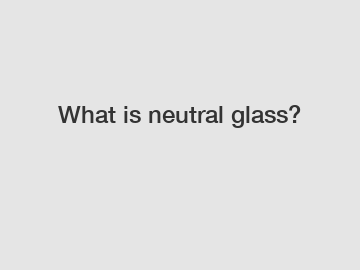What is neutral glass?
What is Neutral Glass?
Glass is an incredible material widely used in various industries for its transparency, durability, and versatility. However, not all glass is created equal. Different types of glass have distinct properties that make them suitable for different applications. One such type of glass is neutral glass, which finds its applications in the pharmaceutical and laboratory sectors due to its exceptional chemical resistance and thermal stability. In this article, we will explore what neutral glass is, its properties, and its uses.
Properties of Neutral Glass.

Neutral glass, also known as type I glass, is a type of glass that is highly resistant to chemical attack. It is made from a unique composition of glass that enables it to withstand the corrosive effects of various chemicals, making it ideal for storing and transporting pharmaceutical products and laboratory samples. Unlike other types of glass, neutral glass has a high hydrolytic resistance, which means it does not react with water or other liquids, ensuring the integrity of the stored substances.
Additionally, neutral glass has exceptional thermal stability. It can withstand significant temperature fluctuations without undergoing any changes in its structure or composition, thereby ensuring the stored products remain unaltered. This property is especially crucial in laboratories where samples may undergo extreme temperatures during experiments or storage.
Uses of Neutral Glass.
Neutral glass is primarily used in the pharmaceutical industry for the manufacturing of injection vials, ampoules, and bottles used for medications. As these glass containers come in direct contact with the drugs, it is essential for the glass to be chemically inert to prevent any contamination or alteration of the medications. Neutral glass provides the required level of chemical resistance and protects the drugs from moisture or chemicals found in the environment.
In the laboratory sector, neutral glass is widely used for the storage and transportation of various types of samples, reagents, and chemicals. It is commonly used for test tubes, beakers, and other containers that require excellent chemical resistance and thermal stability. The ability of neutral glass to withstand harsh chemicals allows scientists and researchers to conduct experiments without worrying about the integrity of their samples or the risk of contaminating their results.
Neutral glass also finds its applications in the food and beverage industry for packaging and preserving products. Its chemical resistance ensures that foods and beverages do not interact with the packaging or leach any harmful substances. This makes neutral glass bottles and jars a safe and reliable option for storing various consumable products.
Closing Paragraph.
In conclusion, neutral glass is a remarkable type of glass known for its exceptional chemical resistance and thermal stability. Its unique properties make it highly suitable for applications in the pharmaceutical and laboratory sectors, where strict quality standards and the preservation of product integrity are crucial. Whether it is for storing medications, laboratory samples, or even food and beverages, neutral glass ensures that the contents remain protected and unaltered. If you have any further questions or would like to learn more about neutral glass, please do not hesitate to contact us.
For more information, please visit types of glass ampoules, glass ampoules for sale, Form C glass ampoule.


